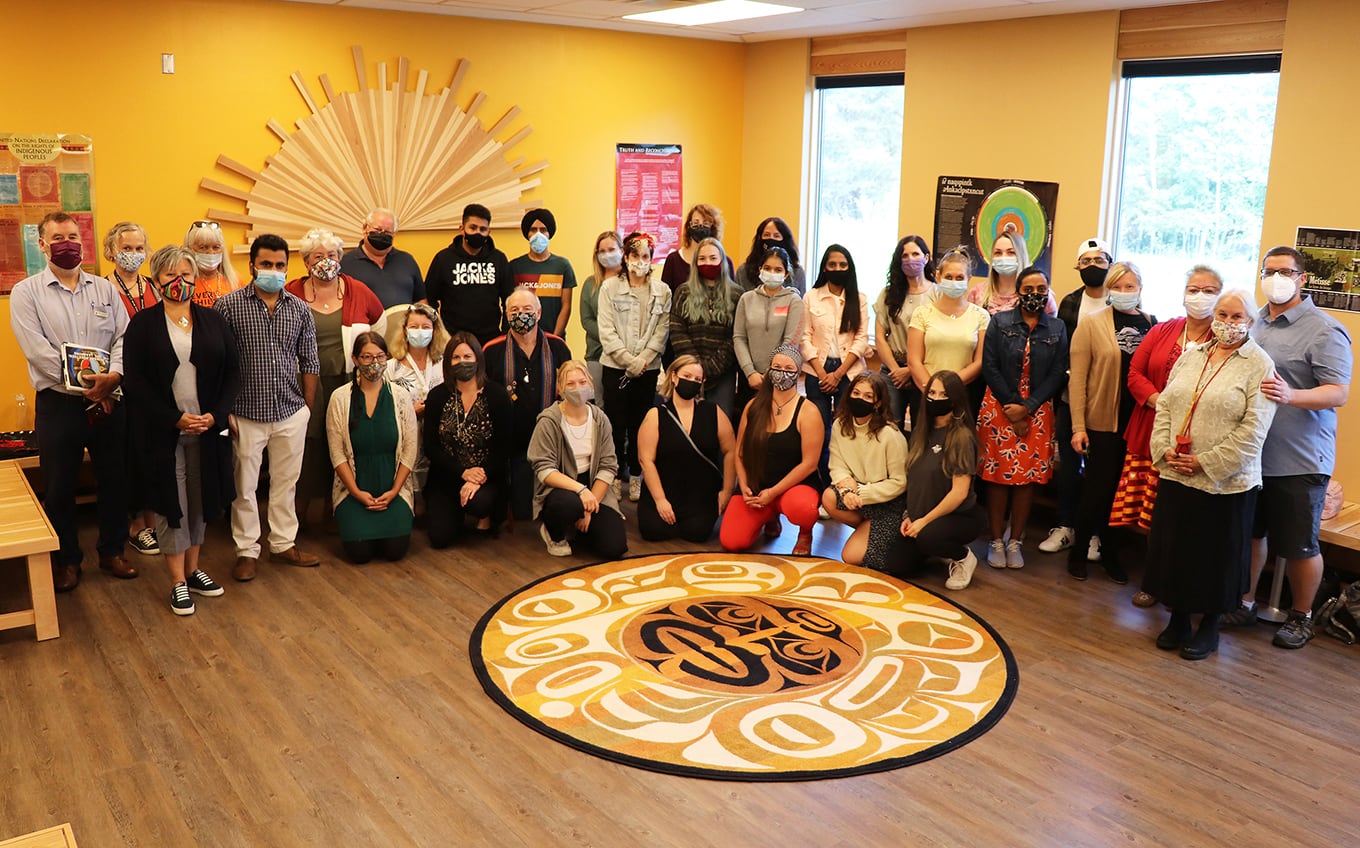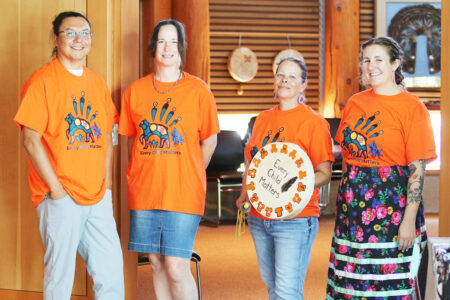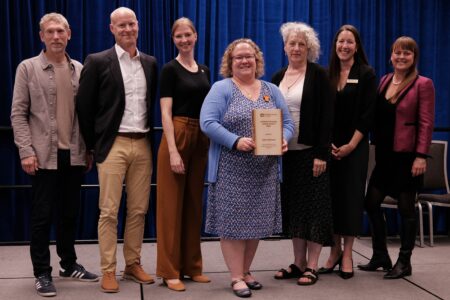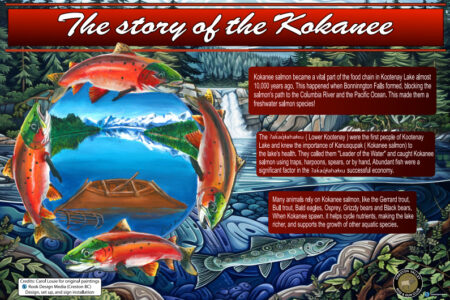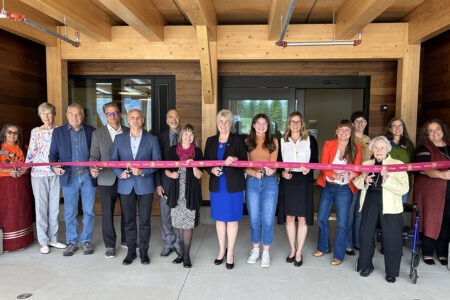Six Selkirk storylines to put a wrap on most unusual Post-Secondary Year
Six Selkirk College Storylines from 2021
Wrapping Up A Most Unusual Year at Post-Secondary
It was a year of adaptation and acrimony. Shrouded by the weight of the COVID-19 pandemic, the Selkirk College community found new ways of working and being that squeezed every drop of creativity and resilience just to figure out a way to get by.
As the region began to emerge from the seemingly singular focus of an invisible enemy in 2020, the events of past 12 months provided little relief. Horrifying injustices of the past were thrust into the spotlight with unmarked graves of Indigenous children, racism reared its ugliness across the nation in disturbing ways, a mind-boggling heat dome morphed local landscapes into tinderboxes that threatened our communities and atmospheric rivers exposed the fragility of British Columbia’s human-built values.
In these times there is no magic elixir, so hope and optimism remain the collective defence. Post-secondary holds a mirror society, but with a gaze that looks past the obvious. Acquiring knowledge, training and skills in times of uncertainty provides a satisfying warmth knowing that it’s more pernicious to be paralyzed by inaction. Over the last 12 months at Selkirk College, students and staff have risen to the challenge by working to be part of the solution through creative thinking, problem solving and good old-fashioned getting your hands dirty.
Before eagerly looking forward to better days ahead, here is a look back at six Selkirk College storylines that helped define 2021 at regional post-secondary…
No Stopping Unbridled Passion for Education
The heartbeat of Selkirk College is the learner and that remained unchanged in 2021.
The winter semester began with necessary and adapted models of delivery that included in-person, online and a mixture of both. A testament to the diligent and dedicated work of faculty and staff, by the second semester of the 2020-2021 academic year, students were able to find a groove that meshed with their educational goals.
By the time the fall 2021 semester arrived, vaccinations, solid health and safety planning, and respect for following the rules, enabled a much-anticipated return to campus that breathed vital life into the hallways, classrooms and shop spaces.
Successful student outcomes were everywhere in 2021, culminating in a virtual Convocation 2021 ceremony that saw almost 900 learners graduate with a credential into a world that needs their new knowledge and skills now more than ever. Whether students were polishing off a program or getting started on a new direction, not yielding to the turbulence of outside forces added a bolstered sense of pride to accomplishment.
In the shops of Nelson’s Silver King Campus, students enroled in School of Industry & Trades Training programs were primarily in-person during the entire year. As students in the Fine Woodworking Program put final touches on projects in anticipation for a virtual year-end show in May, their mentor expressed sincere appreciation for their efforts.
“It has truly been a spectacular year,” said Fine Woodworking Program Instructor David Ringheim.
“Going into this year with all the uncertainty of COVID-19 and how that would affect the students was a major concern. But to be honest, we have been able to make changes where needed and pull off a successful nine months with no disruptions. A large part of this is due to the caliber of students that chose to join us this year. Those choosing to enter into a post-secondary learning environment in a pandemic year shows how dedicated they are to learning the craft of woodworking.”
Reconciliation Offers the Way Forward
In May, Selkirk College lowered flags on campuses and learning centres in memory of the 215 children whose remains were discovered on the grounds of the Kamloops Indian Residential School in Tk'emlúps te Secwépemc Territory. A month later, 182 unmarked graves were identified at the former St. Eugene Residential School on Ktunaxa Nation Territory in the East Kootenay. It was a horrific and stark reminder of the injustices of Canada’s past that heartbreakingly reverberate today.
Selkirk College’s commitment to incorporate relevant Truth and Reconciliation Commission Calls to Action is an essential part of the college’s Indigenization Plan. Providing Indigenous learners with the programs and supports needed to find success at the post-secondary level is key. Parallel to these efforts is affording opportunities for non-Indigenous students and employees to deepen understanding and work together to bring about necessary change. Guest speakers like Ojibwe author Tanya Talaga, Indigenous children and families advocate Cindy Blackstock, and Métis author Jesse Thistle helped present truth in the search for justice.
During the first full week of fall semester classes in September, students and employees joined together to officially open a new Indigenous classroom on the Castlegar Campus. A beautiful room configured and adorned in a manner that inspires interconnected learning, the doors of reconciliation opened wider on that day.
“This classroom is a collective vision that is meant to inspire students and faculty by sharing the knowledge of our Indigenous Elders, artists, scientists and storytellers, acknowledging the right to practice and articulate the wisdom of our ancestors,” said Indigenous Studies Instructor Elizabeth Ferguson, who put forward the idea of an Indigenous classroom. “Here we invite the voices of the ancestors to guide us in our understanding of our responsibility to the land, to respect the spirit that lives in all, to teach with our trickster stories and to bless our connections and interrelationship with all that is. Here we will embrace renewal practices and embed our values so that others may see how we walk in a world that is in a constant state of flux. We invite all to share this knowledge with us.”
Progress for a Leader in Sustainability
As Mother Nature wreaked havoc on British Columbia with “heat dome” and “atmospheric river” entering the common lexicon, the impact of climate change was crystal clear in 2021. The urgency added to the pace of what is required to combat global pressures on our environment is obvious and post-secondary is one of the key contributors to working towards action.
A consistent theme running through all 12 months of the year at Selkirk College was the work being undertaken by faculty and students to contribute crucial steps forward in both creating deeper understanding and tangible action.
In March, the Columbia Basin Rural Development Institute at Selkirk College (RDI) hosted a two-day event called Bridging Silos: Advancing Climate Adaption and Low Carbon Resilience in Small Communities and Rural Regions that attracted expert presenters from across the region and the country. In April, the annual Sustainability Awards were presented to student ZoëLeech and now-retired Director of Facilities Ron Zaitsoff for their ongoing work towards the college’s commitment.
Throughout the year, the Mir Lecture Series presented events aimed at the way forward.
A commitment in the college’s Strategic Plan 2019-2024, sustainability at all levels is a constant within programs and outside the classroom. In 2021, Selkirk College became one of the first Canadian post-secondary institutions to sign onto the United Nation’s Sustainable Development Goals (SDGs) which is a universal call to action to end poverty, protect the planet, and ensure all people can enjoy peace and prosperity by 2030.
“Being a leader in Canada is definitely exciting,” said Laura Nessman, Selkirk College’s Sustainability Coordinator. “What will be even more exciting is to see who signs next and to see our efforts begin to accelerate. Signing the accord has opened up a space for sharing the best practices and resources within both a national and international network of support. My hope is that all areas of the college can see how their work contributes to our ultimate goal of creating a better world.”
Innovation Drives Opportunity for Students and Community
Applied research and innovation at Selkirk College has grown significantly with results that bolster learning, build knowledge and assist the community in a variety of areas. A rural college leader in Canada, the burgeoning arm of regional post-secondary was formally placed under the umbrella of Selkirk Innovates in November.
With a collaborative energy, the Selkirk Innovates team works to solve an eclectic mix of challenging real-world problems presented by government, industry, the non-profit sector, small business and entrepreneurs. The diverse scope of projects includes areas of climate change adaptation, helping small business develop new products, incorporating the latest technology into the forest sector, local government studies on rural homelessness and COVID-19 economic recovery plans.
Selkirk Innovates has grown exponentially over the last four years. With an annual operating budget that has increased from $1 million in 2016 to $3.9 million today, more than 100 faculty and students have worked on 97 different research and innovation projects in the last year. Selkirk College is ranked 39th on “Canada’s Top 50 Research Colleges” list and is second only to the British Columbia Institute of Technology (BCIT) in the province.
“It’s exciting to be around the talent that we have at Selkirk College amongst both students and faculty,” said Dr. Terri MacDonald, the Director of Applied Research & Innovation.
“When you compare across the sector and the country, there are not too many teams in rural settings like ours that have been able to build capacity and collaboration to the level we have achieved. It’s an incredible group of people doing amazing work where they are leading change in our communities by solving problems and creating valuable learning experiences. This is what our success is built upon.”
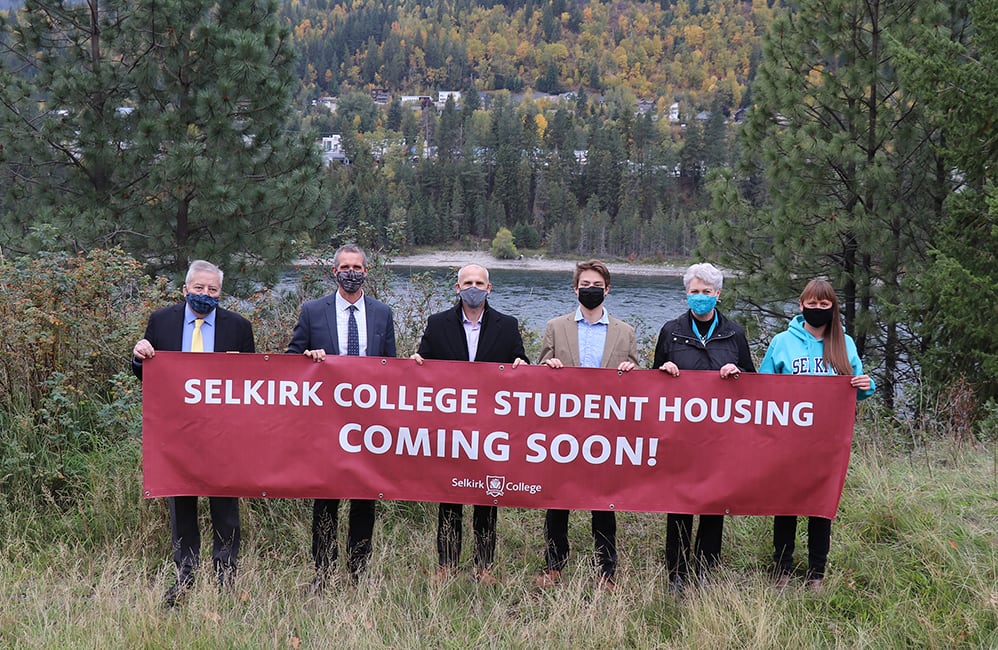
On the banks high above the Columbia River, the new student housing building on the Castlegar Campus will add 112 new beds. On hand for the funding announcement was: (L-R) Selkirk College Vice President of Operations Kerry Clarke, Selkirk College President Angus Graeme, Columbia Basin Trust CEO Johnny Strilaeff, Rural Pre-Medicine Program student Jace Lamoureax, Kootenay West MLA Katrine Conroy and Nelson-Creston MLA Brittny Anderson.
Enhancing the Campus Experience
Selkirk College has been a cornerstone of post-secondary in the region since 1966 and a critical function of longevity is continual improvement to the bricks and mortar that provide an educational platform for students. The presence of uncertainty in the moment has not paused the planning to improved facilities.
With the new-house smell still present at the $23 million Silver King Campus refresh, 2021 continued to see exciting projects announced and others completed. In October, the Ministry of Advanced Education & Skills Training contributed $18 million towards a $24 million student housing project that will see a 112-bed facility built on the Castlegar Campus and a 36-bed facility built in Nelson.
“Equitable access to an affordable post-secondary education is fundamental to our mission,” said Selkirk College President Angus Graeme. “These new units will enable us to address the local student housing crisis and support more students with secure and stable housing. Having the opportunity to live affordably on campus near the classrooms and services means that students can focus on being successful in their courses and programs.”
Along with much-needed student housing, childcare requirements for both Selkirk College and the broader community has been enhanced with November’s official opening of the Silver King Childcare Centre. With a focus on removing barriers to access for learners, the centre will help enable more opportunities for those juggling a work-life balance.
Remarkable Leadership Fuels Success
An inspiring post-secondary career that started almost 30 years ago as a part-time instructor in the Forest Technology Program will come to an end in May 2022 when Selkirk College President Angus Graeme steps out of his role and into new adventures. A steady hand in the president’s chair since 2011, Graeme has guided the institution through success and challenge with a focus on ensuring students get the most out of their community college experience.
“The impact of Angus’s leadership and dedication to Selkirk College cannot be overstated,” said Scott Weatherford, chair of the Board of Governors. “He brings limitless excitement to every initiative, genuine care to every personal interaction, and a deep passion for Selkirk’s mission. Though it’s difficult to imagine post-secondary in our region without his leadership, we respect Angus’s decision and appreciate the extended time he has given for the Board to find a new president.”
Shortly after the announcement in March, the Board of Governors started the process of finding a new leader. Through an engaging and inclusive process that factored in community consultation, internal dialogue and a search committee made up of broad representation, the year ended with three potential candidates touring Selkirk College campuses. The announcement of a new president is expected in early-2022.
The year that was, will not soon be forgotten. Communities have been hardened by circumstances out of our control, but softened by the appreciation for what is within our capacity to change. Time spent with those we love and who care for us is more precious than ever, accomplishment in the face of adversity is more rewarding and knowing that we will eventually emerge stronger is enough to carry forward with positivity.
Post-secondary education at Selkirk College helped provide a foundation of hope in 2021 for students, employees and the wider community. With a continued focus on wellness, the next 12 months will no doubt be an adventure with each bold step taken by individuals a way forward for all of us.


